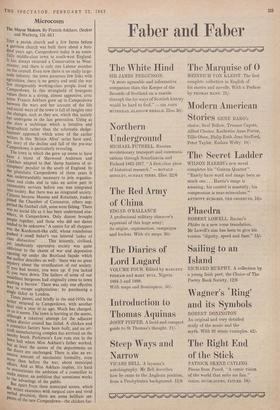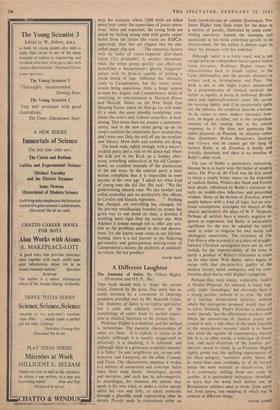Microcosm
The Mayor Makers. By Francis Askham. (Secker and Warburg, 12s. 6d.)
Jusr a parish church and a few farms before a garrison church was built there about a hun- dred years ago, Camperdown today is an essen- tially middle-class town in south-west England. It has always returned a Conservative to West- minster, and there is only one Labour member on the council. Even now there is no really large- scale industry, the town possesses few links with agriculture, there is no gentry and until the war
i few recognisably working-class people lived in Camperdown. In this stronghold of bourgeois values there is a strong, almost aggressive, civic sense. Francis Askham grew up in Camperdown between the wars and her account of the life and social ways of the town is full of insights into the changes, such as they are, which this society has undergone in the last generation. Using as she does a technique which is intuitive and biographical rather than the schematic sledge- hammer approach which some of the earlier Writers in this 'Britain Alive' series have used, her story of the decline and fall of the pre-war Camperdown is particularly revealing.
The town in which she grew up seems to have been a blend of Sherwood Anderson and Chekhov adapted to that `damp haziness of at- mosphere' peculiar to the south of England. In the pluralistic Camperdown of those years it was understandably necessary to join organisa- tions and clubs and to take an active part in community services before one was integrated into society. But there was an integrated society. C. itizens became Masons and Rotarians, traders Joined the Chamber of Commerce, others sup- Ported the football club, some went fishing. 'There was no social life as it has been understood else- Where, in Camperdown. Only dances brought People together, and those who did not dance tended to be unknown.' A centre for all shoppers Was the Kardomah-like cafe, whose roundsman Pushed a small baker's van lettered 'cakes of class distinction. . . This leisurely, civilised, yet intolerably oppressive society was quite oblivious to the chasm of war and depression °Pening up under the Bootland facade which the author describes so well: 'there was no great mystery about the stratification of our society. If You bad money, you were up; if you lacked It, You were down. The fathers of some of our wealthiest burgesses had originally come to town Pushing a barrow.' There was only one effective Way to escape asphyxiation : by purchasing a stogie ticket to London. T. unes passes, and briefly in the mid-1950s the riter returned to Camperdown, with another final visit a year or so ago. Much has changed, Or SO It seems. The town is bursting at the seams, although a takeover attempt for the adjacent urban district council has failed. A chicken and a cosmetics factory have been built, and an air- craft manufacturing complex has arrrived on the town heath. Parkinson's Law runs riot in the !own hall where Miss Askham's father worked, but at least the names of the departments on the .doors are unchanged. There is also an ex- cessive amount of narcissistic formality, even more than before the war, about municipal affairs. And as Miss Askham implies, it's hard to overestimate the ambition of a councillor to Make mayor, an ambition that sometimes works to the advantage of the public.
But apart from these municipal scenes, which the writer examines with surgical care and vivid verbal precision, there are some brilliant set- Pies of the new Camperdown—the chicken fac-
tory, for example, where 3,000 birds are killed every hour under the supervision of junior execu- tives. 'Alive and expectant, the young birds are seized by smiling young men with gently expert hands from the lorries (the crates are RSPCA- approved); their feet are clipped into the elec- trified paper clip and . . .' The cosmetics factory with its tanks of excise-inspected after-shave lotion (Vs drinkable') is another showpiece, while the writer pretty quickly and electively demolishes a businessman's ghastly bungalow- palace with its drive-in capable of holding a whole brood of Jags. Affluence has obviously come to Camperdown, but the writer wisely avoids being censorious. Only a bingo session arouses her disgust, and Camperdown's habit of restricting its entertainment to Maxwell House and Nescafe, Down on the New South End Housing Estate, where the flats go for well under £3 a week, the noise (shoddy insulation), com- plains the town's only Labour councillor, is mad- dening. This estate does not possess a community centre, and in the new estate going up on the town's outskirts the inhabitants have insisted they don't want one. Only the well-off use the excellent new library. Most clubs and societies are dying.
The book ends, rightly enough, with a mayor's cocktail party and a visit to the dance-hall where the kids jive to the Rock on a Sunday after- noon, something unheard-of in the old Camper- down, an excellent example of the atomisation of the old ways. In the cocktail party a local heiress complains that it is impossible to meet anyone of her own age. 'I asked her what kind of young men she did like. She said: "We like good-looking smooth ones. We like bowlers and rolled umbrellas and we particularly like officers in Cavalry and Guards regiments.. ." ' Nothing has changed, yet everything has changed, for the pre-war stratification founded on money has given way to one based on class, a division if anything more rigid than the earlier one. Miss Askham is honest enough not to offer any solu- tion to the problems posed in this sad denoue- ment, for she knows none exists in our lifetime. Instead, there is a last journey to the flickering gas-mantles and green-painted waiting-room of Camperdown's station, the platform of positively no return, the last goodbye.
DAVID REES



































 Previous page
Previous page